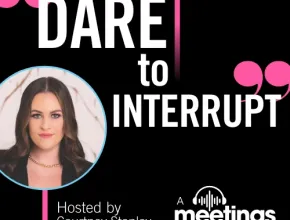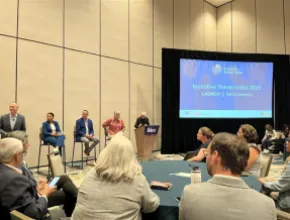Recovery on Pace: "Shimo" Shimasaki on the Pace of Meetings Bookings
Meetings industry veteran Christine “Shimo” Shimasaki, of Simpleview's 2Synergize, is privy to booking pace data from hundreds of DMOs. Here's her well-informed take on where the meetings industry is regarding the return to in-person events, and how data-driven strategic decisions are the key to its future.
Meetings Today’s Tyler Davidson sat down with Shimasaki to discover the latest booking pace data and what it tells us about the recovery of in-person meetings, as well as why meeting profs should focus on adding data analysis skills to their toolbox in order to be relevant in the future.
Listen now:
Read This Next: Anaheim Hosts Largest Convention in Two Years

Tyler Davidson: Hello, and welcome to this Meetings Today Podcast. I'm Tyler Davidson, vice president and chief content director of MeetingsToday.
I am thrilled to have a longtime industry veteran and longtime friend in the industry, Christine "Shimo" Shimasaki, now of 2Synergize, a Simpleview consulting company, joining us today.
She has quite the resume and has really kind of done it all in the industry, including serving as a full-time consultant for Destinations International, where she managed the MINT+ Database and Event Impact Calculator, and also provided leadership and guidance to the industry with specific meetings, market issues and opportunities, and is currently on the faculty of San Diego State University, Master's in Meeting and Event Management, where she teaches Data-Driven Decision Making for Event Professionals.
And, of course, she has filled a wide range of other roles in the industry, including serving as a board member of PCMA and as a chair on Destination International's accreditation board. Thanks for joining us, Shimo.
Christine "Shimo" Shimasaki: Tyler, it's always great to connect with you and your audience. Thank you.
Tyler: And yeah, you've really kind of done at all and touched a lot of areas of this industry. You were even on the hotel side for a while, unless I'm mistaken?
Shimo: Yes, I worked for Marriott for 10 years. And you know, I do want you to de-emphasize the veteran, or the long tenure, that I've had in the industry. It doesn't seem that long.
[More Meetings Today Podcasts: www.MeetingsToday.com/Podcast]
Tyler: Well, it creeps up on you. Yeah, I've got a similar story. And then you were also at the CVB--DMO, I guess is the term now--in San Diego, too, right?
Shimo: Yes, San Diego, now known as the San Diego Tourism Authority, and I still live here in San Diego. But yeah, spent about 16 years with that great organization.
Tyler: Excellent. Well, I think I'm fairly confident you know what you're talking about, so, we'll just kind of jump right into it. Data-driven is the message you're sort of bringing today? Why should planners, meeting planners and event planners be concerned, or really make decisions, based on data?
Shimo: Well, you know, it can be intimidating to talk about data-driven decision making. But let's just start with the problems that we have, and we all certainly can relate to the fact we have a lot of problems in the industry today and have had to make a lot of decisions very quickly when we may not have had all the data that we wanted to substantiate making the decisions that we have made.
But when we talk about strategy and being strategic or wanting a seat at the table, as we say, we really need to examine the approach that we take about recommendations we want to make.
So, we have the opportunity of being, first-hand, being able to see things and know that we need to take a different direction with our events or our various strategies, or it could be even exhibit sales or whatever is the task at hand for us. And how we make the case to others that we have to influence to get on board with our recommendation is that we find when we use data to describe the problems that we're seeing that it becomes sort of, Tyler, the common language.
It somewhat level-sets us to understand, collectively. That quickly can get stakeholders on the same page with you and seeing the issues so that we know we need to take action.
Tyler: And what are some sort of examples of being data driven that would apply specifically to meeting and event planners? What are some key aspects, they can't learn to be data driven in 50 different areas, what are a few that they should really keep their minds focused on?
Shimo: You know, I think we all want to understand what we need to improve upon in terms of year-over-year in terms of our events. One of the main areas that we're collecting quite a lot of data around, Tyler, is not only qualitative data, but quantitative data in our surveys.
So, very typically, we're asking our attendees about where they're satisfied in terms of the event, and also what we see as what they think are most important about our events.
And so, when we collect that survey data, we need to sort of understand not just what they're satisfied with, but what areas of the event were most important to them, whether it was networking, or the quality of the speakers, and then know how satisfied they were on those most important attributes.
So, in data, you're able to conduct some analysis about importance and satisfaction to understand the gaps that you have. And clearly, when you present that sort of issue to others, you can quickly understand the areas of the conference that you would like to improve, or we need to improve.
Tyler: So, what's wrong with going with your gut, right? Your intuition? You know, it served me well up until all this data stuff!
Shimo: You know, that's a really good point, right? Because us "veterans," and I'm kind of doing the air quote thing, as veterans, we can and have relied quite a bit on our intuition. And, and there's really nothing wrong with that other than the fact that can become an opinion, right?
And so, I think for our younger professionals, that are coming into the industry that have a different view, may have a different recommendation. So, when you really take the discipline of examining the problem and start to collect all the information you can about the problem, you start to level set the approach.
So, a younger professional, that just coming into the industry may not have the benefit of all that intuition. And then veterans, we have to kind of examine where our biases are, and really kind of check to see whether we do have a biased view of how we're going to go about a problem such as understanding specifically where we need to improve upon our conferences. And usually, you know, there are investments that need to get made when it comes to improving our conferences.
So, we might need to invest in more virtual technologies or areas that we never had to really put some dollars into. So, this is where data starts becoming really important to justify where we're going to shift dollars as it relates to our investments.
[Related: Is the Hospitality Industry Talent Pipeline Drying Up? Leaders Chime In.]
Tyler: Okay, say I'm hearing your argument and I bought into it. How do you go about developing this skill? I mean, I know, as an editor, I witnessed this change. And, you know, it's all about analytics and traffic and engagement. You know, I guess I sort of jumped in and started swimming.
But, what sort of recommendations or tips do you have for people who maybe are not as skilled as they would like to be in this area?
Shimo: Well, I think that one place to start is Excel. Excel is a really great tool and it's just amazing. I think we use Excel today in a lot of different ways.
The planners that are in some of the courses that I teach, I asked them, how do they use Excel today? And predominantly, they're using it for budgets, which is a good thing, right? But they're also using it for Gantt charts and in manually doing planning--for other ways than doing some analysis.
So first and foremost, I think we have to get comfortable with data, and then really learn to prepare that data for analysis. So, whether or not you take any kind of basic Excel and start to learn how to use some of the other functions in Excel like pivot tables and VLOOKUP--these are different formulas--you could use Excel, but I would start by just diving in to get your hands into the other functions of Excel, other than some formulas that we use predominantly.
Where you can do that is there's several of our industry organizations, MPI, for example, that offers in their Academy an event data analysis certificate course. So that's certainly another place to start. And in all disclosure, Tyler, I do teach that course as well.
Tyler: You sent me that information, so I was gonna bring that up. So, that's good to know. Tell us a bit more about what to 2Synergize does via Simpleview, and I know you do a lot of work with the DMO community, correct?
Shimo: You know, Tyler, I think I've always had a passion and understanding about where the industry headed and how DMOS can support planners in their events. So, I've always played in that space. And I am very passionate about sales strategies and how destinations use a facility like a convention center to drive economic impact for their destination.
So, 2Synergize is all about helping DMOs, and with not only understanding what's going on with customers, but what's going on in the industry as it relates to new events, booking pace, how are we looking for the health of future years in our destinations?
So, when I joined the Simpleview team, we developed a new booking pace tool, and what a booking pace tool does is help destinations understand out into the future, let's say '23, '24, '25, '26, because a lot of events are confirmed six, seven, eight, nine years in advance.
So, we have to really understand the health of these destinations and how are they are doing and performing, and if they're really starting to come into trouble before they're actually in trouble so they can do something about it.
So, these booking pace [tools] kind of helped that story, and we developed this tool, it's called FuturePace.
Tyler: Well, that's a good transition. Now you have all the data, what are you seeing out there? We're coming out of, hopefully--knocking on wood--two years of pandemic with some fits and starts, and everyone's just really wanting the in-person meetings to resume.
What are you seeing? What are the numbers telling you?
[Related: Meetings Today Trends Survey]
Shimo: Well, I'll look at it from two perspectives. So, one is, because I'm affiliated with Simpleview, we power probably over 250 destinations and their customer relationship management systems, their CRM systems, so it helps us be able to monitor the activity that DMOS are doing in the sales area, in terms of providing and generating leads and bookings for their destinations.
So, I look at that and we're looking at this week by week, so the good news is that through, say, the end of February now, beginning of March--and we're talking on March 9--we're starting to see this activity of new leads being generated by DMOs. That is starting to be about 92% of the lead activity.
If I looked at the same time in 2019, and 2019 pre-pandemic is sort of a benchmark that the industry is using, hotels and DMOs, to kind of understand how are we getting back to pre-pandemic levels? So, we're sort of indexing or comparing to 2019 levels. So, the good news is we're about 92% in that lead activity just as of this last week.
Tyler: That is good news.
Shimo: That is good news. So, then I look at it from a FuturePace perspective and trying to look out a little bit further than activity that's happening today.
And we partner with Tourism Economics, an Oxford Economics company, and they do a lot of forecasting for the industry, and they also do some forecasting for FuturePace. So, they're helping us understand, like in 2022, for example, what percent of 2019 are we going to be at?
So, as a year, if I look at the whole year, I'm looking at, right now, about 69% or 70%, of 2019 index levels.
Tyler: So, by the end of the year...
Shimo: ....by the end of the year. So, Tyler, not quite back to recovery, right? We're not quite back to recovery. And when you dissect '22, into quarters, you certainly see that Q1, where we are today is very different than, say, Q4.
So, for example, the ranges, probably 60% in Q1 of 2019 levels, but when you get to Q4, more optimistic--we're expecting a lot more activity. So, that's looking more like 80% of 2019 levels.
So, when we're talking about the recovery in '22, the quarters look very different. And then as I look at '23, just a year from now, we're hoping that an expecting that our recovery will be more in the 90 percentile of 2019 levels.
Tyler: Well, that's good news. I wouldn't imagine who it was coming back as strong as it is. How do things like compression impact all of this with all these meetings that have been postponed and kind of kicked down the road piling up?
Shimo: Well, I think that one factor that we're all watching very closely for destinations and in hotels is certainly some events here in Q1 have gone virtual. They haven't come back to in person.
So, that has certainly not created the compression in Q1 that we would have liked to have seen. But we are seeing quite a lot of hybrid activity. And we're wondering what impact that's going to have on our room blocks that the destinations are holding for future periods.
So, will the hybrid component...how much will that impact? The room block is really not well understood, and certainly something that we're trying to gather some data around, especially when we look at MINT in the historical database.
Tyler: Right. And I personally think most people think that some form of hybrid will be around, but I just don't... I don't think we can be very confident that we'll know the true impact of that will be moving forward.
Shimo: And you know, Tyler, the poor room block has been under siege for quite some time, right? It didn't need a pandemic to sort of create more issues with the contracted room block. And you know, the fact that people go around the contracted room block, anyway.
So, a lot yet to be seen, a lot of data to collect, and I think if we as an industry kind of come together on sharing some of that data and helping each other understand the performance, I think it'll help us all build better strategy for the future.
Tyler: Well, excellent. Thanks for joining us today, Shimo. I appreciate it.
Shimo: Thank you, Tyler.
Tyler: And thank you for tuning in to this Meetings Today Podcast. I'm Tyler Davidson, with Meetings Today, and if you liked what you heard today, head on over to Meetingstoday.com and check out our podcast section, where we have many more interviews with industry thought leaders that hopefully will illuminate your opinions on the meetings and events industry.
So, thanks again for joining us, and whatever you're up to, have a great rest of the day.
Listen Next: Sherrif Karamat, Don Welsh Talk Business Events Industry Week, Trends and Ukraine





